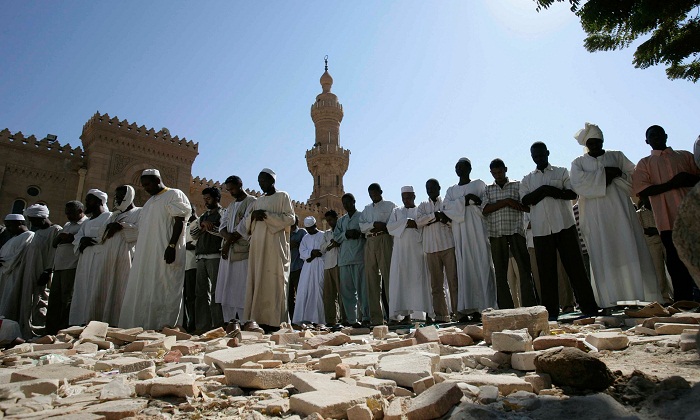The men were released on bail on Monday after being arrested in Khartoum in November while listening to religious teachings and imprisoned for more than five weeks.
The men, aged between 15 and 51, belong to the minority Hausa ethnicity, many of whom follow a different interpretation of Islam to the one sanctioned by Omar al-Bashir’s government.
They are accused of “rejecting the prophet Muhammad’s teachings”, rejecting the Hadith and taking the Qur’an as the sole source of religious legitimacy – a crime punishable by death in Sudan.
A judge granted the men bail on Monday and announced that court proceedings against them had been suspended until February, in what lawyers believe is an attempt to deflect international criticism of the case.
“I think they want to shrink [attention on] the case, because [it] started getting international coverage and [the judge] saw how foreign media covered the story,” said Ahmed Sibare, one of the lawyers defending the group.
The African Centre for Justice and Peace Studies and the Sudanese Human Rights Initiative released a join statement calling for the government to drop the charges against the 25 “who are prisoners of conscience and have been put on trial solely because of their religious beliefs”.
The men are being tried under article 126 of the criminal code which adheres to Islamic Sharia law, but Sibare said the code is clearly in conflict with the Sudanese constitution which guarantees the right to “freedom of thought and conscience”.
The lawyer said he would challenge the article in the constitutional court. “[It is] vague and the authorities use it for malicious reasons,” he said.
Rifaat Abdel-Mo’min Awad, one of the teenagers facing the death penalty, remained defiant after his release. “This law has to be changed because it conflicted with the constitution that gives the rights to people to believe in whatever they want,” he said.
He said he had been listening to the imam with his brother, Fareed, 21, when the police arrived. “He was telling us what the God and his prophet Muhammad said – and suddenly the police came and surrounded us with their guns on our heads like criminals.”
Some people fled the scene, the teenager recalled, but 22 people were put in police cars and taken to the local prison, where they were held for 12 days. They were later transferred with five others to the notorious Omdurman prison in western Khartoum, where they were kept for four weeks until being released on bail on Monday.
“I will never change my mind from what I was told is the right and true Islam, even if they want to kill us, let them do so,” Awad said.
If the accused agree to renounce their beliefs in court, the sentence could be commuted to five years in jail.
Members of Khartoum’s Hausa community meet regularly in street markets to listen to readings from the Qur’an translated into Hausa, the group’s native language, as many of them are not fluent in Arabic.
Though Sudan is a religiously and ethnically diverse country, Bashir has long made his intolerance towards the country’s Christian and traditional African religions clear. They make up 3% of the country’s population, according to official figures.
Bashir declared in 2010 that the country would follow Sharia law: “We don’t want to hear anything about diversity – Sudan is an Islamic and Arabic country.
Rifaat’s father, Abdel-Mo’min Awad, said: “I really don’t know why we’re being targeted by the authorities. We are not politicians and we don’t care about politics, we only worship God.”
Mohamed Badwai, from the African Centre for Peace and Justice Studies, said this latest case shows the urgent need for legal reform in Sudan, where jailing citizens for their beliefs has become routine. “The ruling party uses trials like these to repress the people in Sudan, and force them into its preferred way of life,” he said.
Last year, a pregnant Christian woman from Khartoum, Meriam Ibrahim, narrowly escaped death row after she too was accused of apostasy and adultery for marrying a Christian man.
More about:
















































